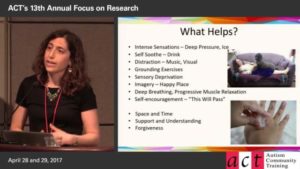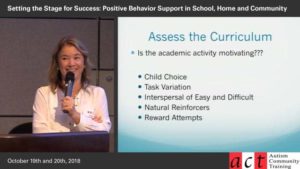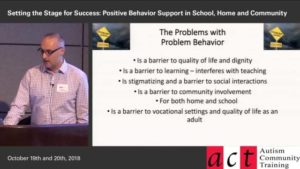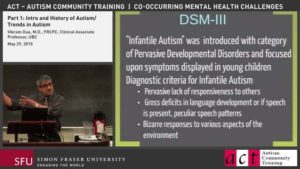Filmed November 2015 – edited into 13 parts; total 153 minutes
Presented by Deborah Pugh, Executive Director, ACT – Autism Community Training
This presentation highlights essential information for parents, and the professionals who support them, in understanding the systems that control access to services for children with diverse needs. Many of the examples are from British Columbia’s education system, but the basic principles of effective advocacy apply to most jurisdictions. The materials presented in this workshop include guidance to empowered families to understand their rights, roles and responsibilities with practical information on how to achieve their advocacy goals.
Deborah Pugh has been an active advocate on behalf of children and adults with diverse needs for over 20 years, following a career as a foreign correspondent. For details of Deborah’s work see the ACT Staff page.
Part 1: Introduction (11:24)
Part 2: The Big Picture: What is Advocacy? (9:32)
Part 3: Building a Team / Why Advocate? (10:55)
- ACT’s Autism Manual for B.C. Chapter 2 – Developing a Treatment Team (PDF)
- Contact ACT- Autism Community Training
- Planned Lifetime Advocacy Network (PLAN)
- Disability Assistance (B.C. Gov)
- Disability Benefits | FAQs (Disability Alliance B.C)
- Positive Behaviour Support – a Conversation with Dr. Pat Mirenda
- Families and Positive Behavior Support. By Joseph M. Lucyshyn with Glen Dunlap
- Applied Behaviour Analysis – Capilano University
- ACT Video: Positive Behavior Support – What Parents Need to Know. By Dr. Brenda Fossett
Part 4: Geographic Differences: Laws or Services (7:20)
- Autism Society of B.C
- Canadian Autism Spectrum Disorder Association
- Canadian Association for Community Living
- ACT Video: Education, Integration, Inclusion. Key Information for Parents of Children with Diverse Needs. By Dr. Suzanne Jacobsen
- Autism Funding in B.C.
- Registry of Autism Service Providers (RASP)
Part 5: The Autism Dimension in B.C. (4:54)
- B.C. Autism Funding Program
- The Auton Decision (2000)
- The Hewko Decision (2006)
- Moore Decision (2012)
Part 6: Finding the Information You Need (ACT Resources) (23:13)
- Autism Information Database (AID)
- New Diagnosis Hub
- Search the RASP
- Autism Videos @ ACT (AVA)
- ACT’s Autism Manual for B.C.
Part 7: Keep the Focus on Your Child – Developing a Profile (10:31)
Part 8: Question & Answer Period (7:56)
- PEERS Program
- ACT Video: Education, Integration, Inclusion. Key Information for Parents of Children with Diverse Needs. By Dr. Suzanne Jacobsen
- Provincial Outreach Program for Autism and Related Disorders (POPARD)
Part 9: The Mechanics of the School System (16:01)
- B.C. Education Policy
- B.C. School Act
- B.C. Special Education Policy Manual
- Distributed Learning in B.C.
Part 10: Hierarchy of Policy (7:36)
Part 11: People in the System: Roles and Responsibilities
Part 12: Advocacy Skills: Documentation, Letters, Meetings and Appeals (15:37)
Part 13: Question & Answer Period (18:40)
- POPARD Consultants
- ACT Video: Positive Behavior Support – What Parents Need to Know. By Dr. Brenda Fossett
- Families and Positive Behavior Support
- Hewko Decision (2006)
- Finding the Right Behavior Consultant for Your Family
- ACT Video: Solving Sleep Problems in Children with ASD. By Dr. Beth Ann Malow
Part 14: Internal and External Appeals (14:19)
- Appeal to a B.C. Board of Education
- Appeal to a Superintendent of Appeals
- Locating Administrators in B.C.School Districts
- Making a Complaint to the B.C.Ministry of Children and Family Development
- Making a Complaint to the Office of the Representative for Children and Youth of British Columbia
- Advocate for Service Equality
- Community Living B.C. Complaints Resolution Process
- ACT’s Autism Manual for B.C.Chapter 12 – Guide to Employment for Teens and Adults with Autism in B.C.
- Personalized Support Services (Adults)
- BC Human Rights Tribunal
- B.C. Ombudsperson
Part 15: The Professional Colleges & Human Rights Tribunal (11:23)
- Professional Regulation
- Teacher’s ACT
- College of Physicians & Surgeons
- College of Dental Surgeons
- College of Psychologists
- College of Speech and Language Therapists
- College of Occupational Therapists
- College of Physical Therapists
- RASP Complaint Process
- BC Association of Behavioural Analysis
- Human Rights Code







